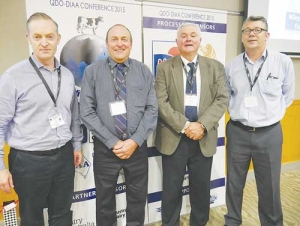Dairy prices defy ample supply as market momentum builds
Global dairy prices continue to rise despite ample supply from key milk producing countries including New Zealand.
 Lion Dairy & Drinks managing director Peter West with Norco deputy chair Tony Wilson, QDO’s Wesley Judd, and Parmalat national manager, farm sustainability and communication, Steve Oldridge.
Lion Dairy & Drinks managing director Peter West with Norco deputy chair Tony Wilson, QDO’s Wesley Judd, and Parmalat national manager, farm sustainability and communication, Steve Oldridge.
Queensland farmers have received a sobering message about the effects of a supermarket war on the price of milk and dairy products.
Lion Dairy & Drinks managing director Peter West told farmers at the recent Queensland Dairy Conference to brace for lower milk prices.
The price wars in the regular milk category started in 2011 when major retailer Coles unveiled A$1/L milk; rival supermarket chain Woolworths quickly matched the offer. Coles recently set the lowest mark yet for the product, cutting the cost from A95c/L to A90c/L.
“The prices I get today will be lower next year, lower the year after and the year after that,” West said. “I can guarantee you there will be five years of price deflation.”
He said a strategy of pursuing growth opportunities and cutting costs was driving Lion’s response, highlighting that consumer trends towards full fat milk, butter, coffee and natural products was great for the sector.
“DARE iced coffee now outsells Coca-Cola in convenience stores,” he said. “This is a market in enormous change and transition [and] it is the future of a more vibrant dairy industry.”
He said the need for authenticity in products – supported by the government’s new country of origin labelling laws – will also bode well for Australian dairy, but he urged caution about seeing China as the saviour of industry.
“The opportunities are there but it will be volatile and harder than everybody thinks. This market is hugely sophisticated and competitive.”
The company has also launched a new ‘Milk Matters’ campaign to remind local consumers of the effort that goes into producing a litre of milk.
“We want people to think again about all the work that went into that product, and we want them to have an emotional reaction to the things they take for granted -- your hard work required for this product that [often costs less] than water. [We want them to ask], is that right?”
The company has cut budgets and staff and offloaded its cheese businesses in an “unrelenting” effort to reduce costs.
West said a “strong focus on mutuality” – supporting farmers to be viable and successful – was also a focus of their approach and the company is looking to help suppliers reduce costs, eg by bulk energy purchasing.
“We all want to see the notion of a fair price. There will always be a tension about how much that is, but our aim will always be to pay the maximum we can afford.”
Parmalat’s Steve Oldridge told of new measures to help farmers save production costs including bulk energy and feed, and benchmarking tools and increased communication with farmers. He said the company and was looking to ensure suppliers had sustainable profit margins.
Fonterra’s impending exit from the Australian dairy industry is a major event but the story doesn’t change too much for farmers.
Expect greater collaboration between Massey University’s school of Agriculture and Environment and Ireland’s leading agriculture university, the University College of Dublin (UCD), in the future.
A partnership between Torere Macadamias Ltd and the Riddet Institute aims to unlock value from macadamia nuts while growing the next generation of Māori agribusiness researchers.
A new partnership between Dairy Women’s Network (DWN) and NZAgbiz aims to make evidence-based calf rearing practices accessible to all farm teams.
Despite some trying circumstances recently, the cherry season looks set to emerge on top of things.
Changed logos on shirts otherwise it will be business as usual when Fonterra’s consumer and related businesses are expected to change hands next month.
OPINION: Fonterra may be on the verge of selling its consumer business in New Zealand, but the co-operative is not…
OPINION: What does the birth rate in China have to do with stock trading? Just ask a2 Milk Company.